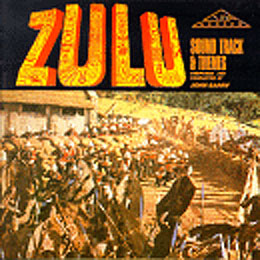The Movie
In 1879, a Zulu army of around 4,000 men armed with traditional spears, shields and body armor engaged a force of about 1,500 British infantrymen armed with Enfield rifles--and slaughtered them. They then moved down to attack the rear of the British army, which would have been disasterous.
But between the Zulus and their objective, there was a small garrison of about 100 men who guarded a hospital and supply depot at Roarke's Drift. With a 40:1 numerical advantage, the Zulus should have squashed them like a grape, but instead were thrown back by the ferocious resistance of the South Wales Borderers. The Zulus attacked again, and again—and again. At the end of the battle, the British had held on.
Eleven Victoria Crosses were awarded to the group—Britain's highest medal and only given out for extreme heroism.
It's quite a movie to see. It's the kind of movie where even though you know the ending in advance, you wonder how on earth they'll manage it as the movie unfolds. This is the film that (along with Alfie) made Michael Caine a star. It didn't hurt John Barry's career a bit either. |
The Music
There's not much of JB's original music in the film—some 16 minutes of original music, and another 20 minutes of traditional "stamps." The Zulu stamps (cues 8 through 13) on the soundtrack are Barry-arranged pop versions, not the traditional stamps as heard in the movie.
Attentive listeners may recognize themes from Zulu in a later Barry score, Cry, the Beloved Country. |
Release Notes
Zulu is probably the most widely reproduced (in its original form) of John Barry's scores. As I mentioned in the notes to Elizabeth Taylor in London and Four in the Morning, whoever owns the rights must license this cheap, because it shows up everywhere. Unlike those other scores, though, Zulu was a big hit, a classic, and remains easily available on video and DVD.
The original score came out on LP as its own soundtrack, and has subsequently been issued numerous times as parts of compilations, including 007 and Other Great Soundtrack Themes , Bond by Barry, Cinema Gold, John Barry: The Ember Years Volume II and Zulu and Other Themes, among others. To the best of my knowledge, Zulu's first commercial CD appearance was when Fatboy released it as part of its 4-CD boxed set, and it subsequently has been released in one form or another--often paired with another album.
Nic Raine recently released his own re-recording CD, Zulu, which has his recreation of the score plus numerous other things. Nic Raine's version of Zulu's title theme shows up on The Classic John Barry and The Collection.
Quartet Records released a remastered and expanded CD edition. On first look, it seems odd that they reproduced the original album twice, once in stereo and once in mono, but their notes say that the two original album releases (separate stereo and mono releases were very common in the 1960s) had different takes for some of the tracks, so the music wasn't exactly the same on both (Barry's OST for Thunderball has two different versions of "Mr. Kiss Kiss Bang Bang," so it's not unheard of). Their CD also offers the title and close music without Burton's narration, and a couple of alternate versions. Track 28 appears to be completely new. |
